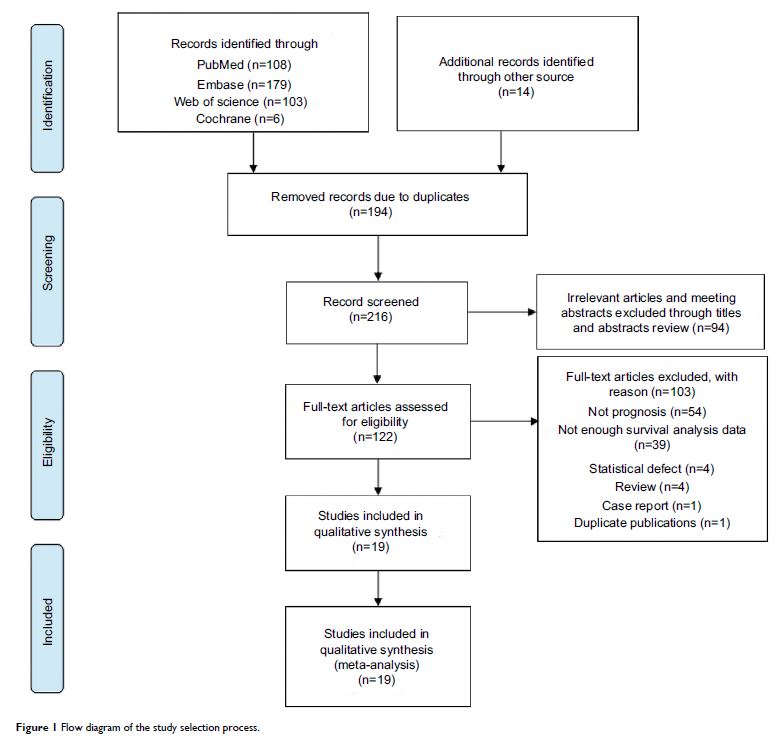108384
论文已发表
注册即可获取德孚的最新动态
IF 收录期刊
- 3.4 Breast Cancer (Dove Med Press)
- 3.2 Clin Epidemiol
- 2.6 Cancer Manag Res
- 2.9 Infect Drug Resist
- 3.7 Clin Interv Aging
- 5.1 Drug Des Dev Ther
- 3.1 Int J Chronic Obstr
- 6.6 Int J Nanomed
- 2.6 Int J Women's Health
- 2.9 Neuropsych Dis Treat
- 2.8 OncoTargets Ther
- 2.0 Patient Prefer Adher
- 2.2 Ther Clin Risk Manag
- 2.5 J Pain Res
- 3.0 Diabet Metab Synd Ob
- 3.2 Psychol Res Behav Ma
- 3.4 Nat Sci Sleep
- 1.8 Pharmgenomics Pers Med
- 2.0 Risk Manag Healthc Policy
- 4.1 J Inflamm Res
- 2.0 Int J Gen Med
- 3.4 J Hepatocell Carcinoma
- 3.0 J Asthma Allergy
- 2.2 Clin Cosmet Investig Dermatol
- 2.4 J Multidiscip Healthc

肿瘤患者 PHH3 表达的预后价值的汇总分析
Authors Hao Q, Dai C, Deng Y, Xu P, Tian T, Lin S, Wang M, Liu K, Song D, Wu Y, Guo Y, Dai Z
Received 7 March 2018
Accepted for publication 14 May 2018
Published 30 July 2018 Volume 2018:10 Pages 2279—2288
DOI https://doi.org/10.2147/CMAR.S167569
Checked for plagiarism Yes
Review by Single-blind
Peer reviewers approved by Dr Andrew Yee
Peer reviewer comments 2
Editor who approved publication: Professor Kenan Onel
Background: Various studies have evaluated the significance of
phospho-histone-H3 (PHH3) expression in cancer patients, but controversy over
its reliability remains. We conducted a meta-analysis to summarize the
prognostic relevance of PHH3 expression in cancer patients.
Patients and methods: Nineteen studies, including 4803 patients, were identified by
searching PubMed, Web of Science, Embase, and Cochrane Library. The correlation
of PHH3 expression level with overall survival (OS), disease-free
survival, and recurrence-free survival was analyzed.
Results: Overall, the results suggest that high expression of PHH3 can
predict a poor OS (HR=2.66, 95% CI=1.74–4.08, P <0.001),
disease-free survival (HR=3.40, 95% CI=1.47–7.87, P =0.004),
and recurrence-free survival (HR=2.80, 95% CI=1.61–4.85, P <0.001) in cancer patients.
The subgroup analysis showed that highly expressed PHH3 was significantly
related to breast cancer (HR=5.66, 95% CI=2.72–11.78, P <0.001) and urogenital tumors
(HR=3.01, 95% CI=1.78–5.09, P <0.001).
Furthermore, no significant difference was found between Asian (HR=1.98, 95%
CI=1.08–3.63, P =0.026) and
Caucasian populations (HR=3.01, 95% CI=1.87–4.85, P <0.001)
regarding OS and PHH3 expression.
Conclusion: This meta-analysis indicates that high expression of PHH3 may
serve as a biomarker for poor prognosis in patients with cancer.
Keywords: PHH3, prognosis, human cancer, meta-analysis, survival
